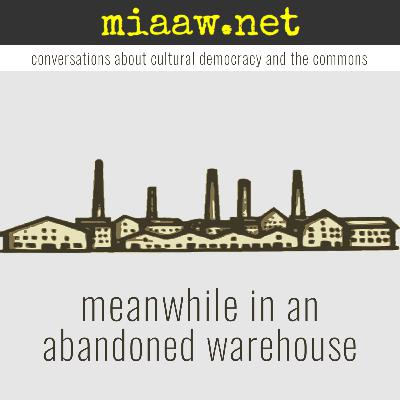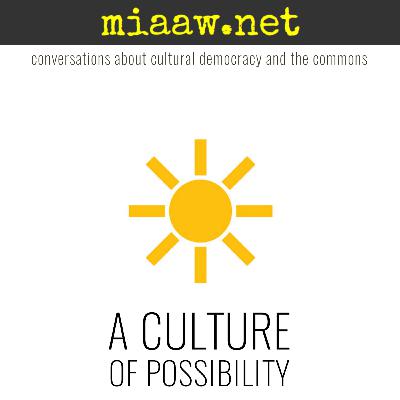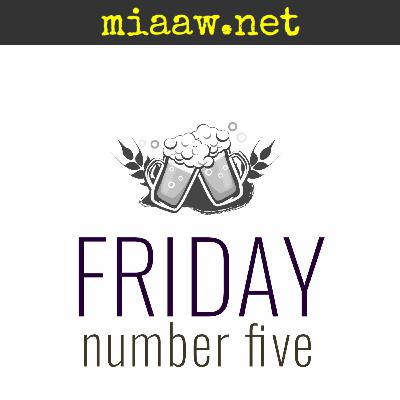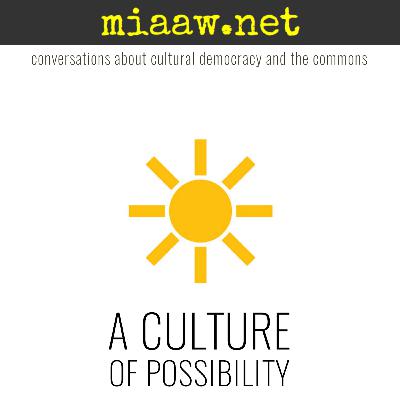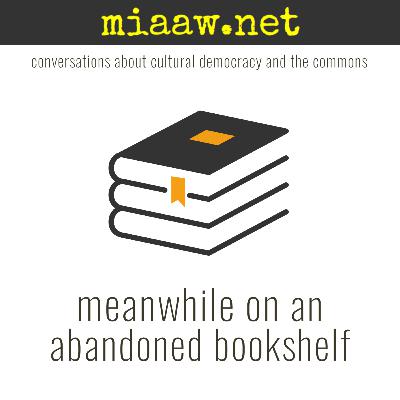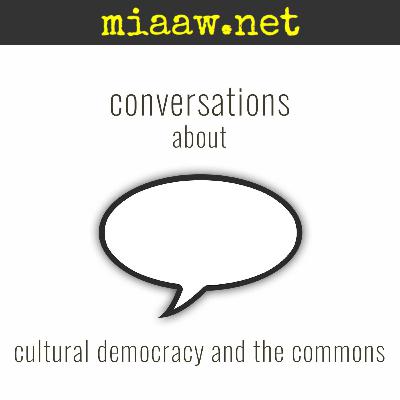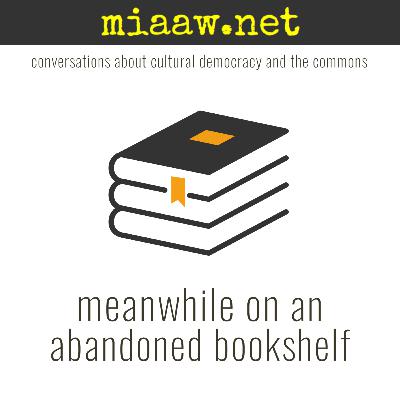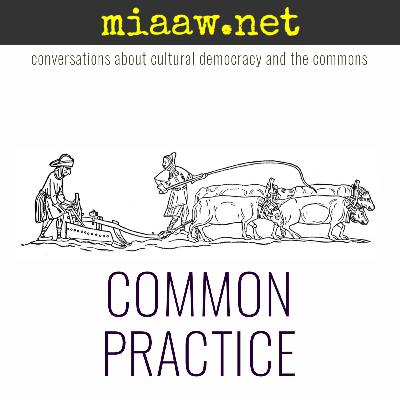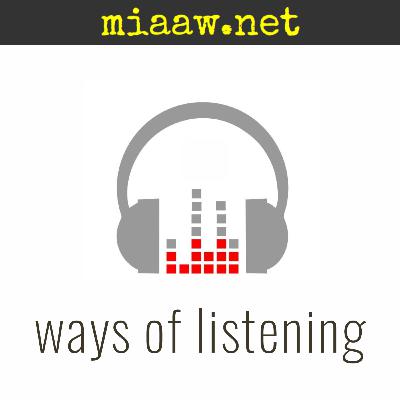Discover miaaw.net
miaaw.net

100 Episodes
Reverse
When Arlene Goldbard is not being a cultural activist or a consultant, she paints. When she is not painting she writes. She writes essays and novels. Her latest novel <em>The Intercessor</em> has just come out.
Owen Kelly talks to Arlene about how this specific burst of writing began, how the novel grew from the initial writing, and what she hopes the published book might achieve.
DECEMBER 5 | SERIES 2025
STREAM Meanwhile in an Abandoned Warehouse | EPISODE 81
PARTICIPANTS
Arlene Goldbard | Owen Kelly
COMMENTARY
This month Owen Kelly discusses Arlene Goldbard’s new book, a novel titled <em>The Intercessor</em>, and asks why she chose to write this unusual kind of novel at this particular time.
The novel offers a linked series of short stories, each foregrounding one character from a group whose stories eventually interlock. All of the characters have political, social or spiritual issues which come to seem less like categories than like different coloured lenses through which we can approach the world.
The novel explores the Jewish Renewal movement, among other themes, without wanting its audience limited to Jews or even less to Jews with an interest in the Jewish Renewal movement.
Arlene explains how this specific writing began, how the novel grew from the initial writing, and what she hopes the published book might achieve.
REFERENCES
Arlene on Wikipedia
Arlene’s website
Arlene Goldbard: Clarity (2004)
Arlene Goldbard: The Wave (2013)
Arlene Goldbard: The Intercessor (2025)
Jewish Renewal, described on Wikipedia
Adin Steinsaltz: The Thirteen Petalled Rose
Arlene Goldbard and François Matarasso interview Laura Raicovich about Fall of Freedom, which begins on the day this podcast drops.
NOVEMBER 21 | SERIES 2025
STREAM A CULTURE OF POSSIBILITY | EPISODE 58
PARTICIPANTS
Arlene Goldbard | François Matarasso | Laura Raicovich
COMMENTARY
On episode 58 of A Culture of Possibility, Arlene Goldbard and François Matarasso talk with writer and curator Laura Raicovich, one of the initiators of Fall of Freedom, an action beginning 21 November in the US, described as “an urgent call to the arts community to unite in defiance of authoritarian forces sweeping the nation,” “activating a nationwide wave of creative resistance.”
Artists and organizations are invited to participate by hosting public events of any size. We’ll talk about the organizers’ hopes and their sense of why and how art can resist authoritarianism.
Since this podcast goes out on November 21, it could not be timelier. Listen to the podcast, go to miaaw.net to get the links, and then look and see what is going on where you are!
REFERENCES
Fall of Freedom website
Download the Fall of Freedom Toolkit
This month Owen Kelly looks at some of the deeper meanings of Katie Lam’s recent remarks on cultural coherence.
NOVEMBER 7 | SERIES 2025
STREAM Meanwhile in an Abandoned Warehouse | EPISODE 80
PARTICIPANT
Owen Kelly
COMMENTARY
In this episode Owen Kelly looks into the idea of cultural coherence, something that bubbled to the surface after Katie Lam, a member of parliament for the Conservative Party used it in an interview with the Sunday Times. She appeared to use it one way, and then later claimed she meant it in a rather different way.
What do people mean by cultural coherence? Should we regard the idea as dog-whistle politics, or should we see it as a useful idea we need to claim for ourselves, before it gets claimed by those who would whistle to dogs…
REFERENCES
Sam Leith: In Defence of the Rules-based Order, in The Spectator
Tali Fraser: The Tories and the search for cultural coherence on ConservativeHome
The Sustainability Directory
In this episode we explore Faircamp again, trying to find something to celebrate halloween. Then we take a peep at what we can find at Tribe of Noise.
OCTOBER 31 | SERIES 2025
STREAM Friday Number Five | EPISODE 19
HOST
Owen Kelly
COMMENTARY
Today (or tonight, depending on where you are) we have the final Friday Number Five of 2025. At the end of January we started another irregular series of Radio Miaaw: podcasts of music issued under Creative Commons licences; a theme we last explored four years ago.
This month have another dive into the contents you can find while exploring the Faircamp web ring. This covers a wide range of music so if one piece doesn’t grab you then rest assured: something different will be along in a minute or so.
Since today is Halloween we also try to find some suitable music, fail, and see what we can find at Tribe of Noise instead.
REFERENCES
The Faircamp website
The Faircamp webring FAQ
Johann Bourquenez: Diminished Epicness & more
Blix Byrd, including Skinning a Tiger
Voodoo Economics, the EP
Nightmother: The Beach Boys In My Room
A Companion of Owls: Sketches for Aural Ataraxia
Ruby Louise Rose: projects, downloads, works in progress
Helen Bell at Faircamp
Helen Bell at Bandcamp
Helen Bell: Molecule
Olive: Halloween Party v2.0 at Tribe of Noise
Rob Dell Music: I do believe in Christmas at Tribe of Noise
Arlene Goldbard and François Matarasso interview Betsy Damon whose work with water has had a healing impact across the globe. She talks about her work from early projects in China to her current undertakings.
OCTOBER 17 | SERIES 2025
STREAM A CULTURE OF POSSIBILITY | EPISODE 57
PARTICIPANTS
Betsy Damon | Arlene Goldbard | François Matarasso
COMMENTARY
Betsy Damon is an internationally-recognized artist whose public work and living systems, such as the Living Water Garden, have received widespread acclaim.
In 1991 Damon founded Keepers of the Waters,[23] a nonprofit organization that serves as an international community to encourage "art, science and community projects for the understanding and remediation of living water systems." The nonprofit is run with a collaborative approach and was started with the support of the Hubert Humphrey Institute.
In 2006, Damon, alongside a group of artists, scientists, and funders, met in Vancouver and created a summary report for UNESCO titled <strong>Art in Ecology – A Think Tank on Arts and Sustainability.</strong> UNESCO had commissioned a report in advance of this meeting titled <em>Mapping the Terrain of Contemporary EcoART Practice</em>, of which the meeting and summary report were a result.
She is the author of <strong>Water Talks: Empowering Communities to Know, Restore, and Preserve their Waters.</strong>
On episode 57 of A Culture of Possibility, Arlene Goldbard and François Matarasso interview Betsy Damon.
Her work with water has had a healing impact across the globe and in this fascinating episode, she talks about her early projects in China and the work she’s undertaking now.
She also shares excellent advice for others who want to help.
REFERENCES
Betsy Damon’s website
Betsy Damon’s CV
Betsy Damon in Wikipedia
Susan Jones works as an independent arts researcher and writer who holds specialist knowledge and insight about the social and political environment for artists and contemporary visual arts.
She has just completed her independent qualitative and longitudinal study Artists' lives: ecologies for resilience, formed around case studies of 14 visual artists from three English regions. She has been working on it for the last two years.
She argues that successive policies since have marginalised artists’ position in the infrastructures and ‘ecology’ of the arts. Arts policy’s ‘market economy’ approach has the effect of undermining its stated aspirations to demonstrate equity and inclusion across the arts.
Owen Kelly reviews a pre-publication version of the report, and comments on it. He notes that, rather than “the usual suspects”, the report has been supported by Axisweb, CAMP: contemporary art membership platform, and Creative Land Trust.
On episode 56 of A Culture of Possibility, Arlene Goldbard and François Matarasso offer their third podcast in a series about censorship and related issues, following on episode 54 with writer Jeff Chang and episode 55 with muralists Amber Hansen and Reyna Hernandez.
Arlene and François talk about their own direct experiences with these issues, including times community artists had to chose which aspects of a project to share or not, and times when establishment arts forces suppressed cultural policies because they objected to cultural democracy principles.
It’s not only art that’s vulnerable, but also ideas about art and culture!
According to Wikipedia, Jon Savage “is an English writer, broadcaster and music journalist, best known for his book about the Sex Pistols and punk music, England's Dreaming”.
He has also written a lengthy and very detailed book called Teenage: the creation of youth 1875 - 1945, and in this episode Owen Kelly looks at that, and points to some of the many interesting and useful connections and examples that Savage has dug up.
The blurb on the back of the book says that “Savage fuses popular culture, politics, and social history into a stunning chronicle of modern life”. Certainly it provides a mass of detailed examples drawn from an extraordinarily wide range of sources, that will provide many surprises for everyone who has not spent the last decade reading exactly the same sources as Jon Savage.
Oh look its the fifth Friday of August. That must mean its time for another episode of Friday Number 5!
At the end of January we started another irregular series of Radio Miaaw: podcasts of music issued under Creative Commons licences; a theme we last explored four years ago.
This month we have another unexpected surprise. We have found Faircamp, which aims to achieve something similar to Bandcamp, without any corporate shennanigans. If you want to distribute your music online then you can download as a free open-source software. It allows you to create your own website in fifteen or so minutes, with no previous experience.
More interestingly, the website has a web ring built into it, so you join a community as soon as you put your site online.
In this episode we explain what a webring is, and then dive into some of the music available on the Faircamp webring. In the time available we barely touch the surface.
On episode 55 of A Culture of Possibility, Arlene Goldbard and François Matarasso host muralists Amber Hansen and Reyna Hernandez, who were the first interviewees on the podcast!
Following on Episode 54, in which Jeff Chang detailed the censorship of his book by the US Department of Defense, Amber and Reyna talked about the more local or subtle forms of pressure to censor or self-censor, such as agencies that commission community murals and then withdraw because they don’t like the subject matter.
When and how is expression limited by those in power and when and how is artists’ work shaped by considerations or controversy or empathy?
Miriam Toews is a Canadian author, and Fight Night is her seventh novel. It tells the story of a grandmother, a pregnant mother, and her young daughter who find themselves living together as an intergenerational family while having to cope with life-changing situations.
It reads as a comedy and a commentary. It feels hilarious and deeply moving.
Owen Kelly suggests reasons why you should find a copy and add it to your holiday reading.
On episode 54 of A Culture of Possibility, Arlene Goldbard and François Matarasso interview author Jeff Chang, known for his books on cultural subjects including hip-hop, race and racism, and Asian Americans.
In May, Jeff posted to his Substack an account of how the Defense Department had removed his book, Can't Stop Won't Stop: A Hip Hop History, written for young adults, from schools on US military bases around the world. The reasons given were Trump’s executive orders banning accounts of racism, gender and sexuality, and other such topics.
Jeff joins us to tell the story and talk about what it means for the future of free expression and diversity.
In this episode Sophie Hope talks to artist, researcher and teacher Anthony Schrag about a symposium he organised on 9 May 2025 at Queen Margaret University in Edinburgh.
The symposium, entitled Getting it right/Getting it wrong: Socially Engaged Art and Ethics was supported by Paul Mellon Centre for Studies in British Art.
Sophie attended the symposium and in this discussion she and Anthony reflect on some of the discussions that they took part in during the event. They reflect on what ethics means to practitioners and their practice, and to assessors and onlookers.
On Episode 53 of A Culture of Possibility, “Money Changes Everything,” Arlene Goldbard and François Matarasso talk about funding for community-based art and cultural democracy in light of the two previous episodes featuring funders from the UK and US.
What’s happening? What does it all mean?
Where can we go from here?
According to Wikipedia “Iain McGilchrist's 2009 work, The Master and His Emissary has sold over 200,000 copies worldwide. It sought to consolidate research in brain lateralisation and to insist on the individual and cultural importance of the bi-hemisphere structure of the brain”. McGilchrist suggests that “we have become entranced by the version of the world brought into being by the left hemisphere and forgotten the insights produced by the right”.
His publishers persuaded him to write a very short book, Ways of Attending, which took the main arguments of his larger, more complex and more technical work, and rewrote them as an extended essay for interested lay-people.
In this episode Owen Kelly looks at some of these arguments, quoting from Ways of Attending and McGilchrist’s other published extended essay, The Divided Brain.
This month we have the second Friday Number Five of 2025. At the end of January we started another irregular series of Radio Miaaw: podcasts of music issued under Creative Commons licences; a theme we last explored four years ago.
This month we have a special and unexpected surprise. Moby and Little Walnut Productions have re-launched mobygratis with, their words “phenomenally expanded functionality and resources, making it the most robust iteration yet”.
They go on to say that “With the addition of 300 previously unreleased tracks, mobygratis provides creators with a revolutionary platform for accessing restriction-free music. This collection is part of an anarchist experiment in creative freedom, allowing unprecedented access to high-quality compositions.
Previously available only as stereo masters, mobygratis now offers hundreds of multitrack audio files. These high-resolution tracks invite collaboration by enabling creators to remix, customize, and fully adapt the music to their unique projects, fostering a spirit of shared creativity and innovation.
Formats include stereo MP3, stereo WAV, and multitrack WAV - all completely free”.
In this episode we dig deeper into #mobygratis, take a look at the contract you receive when you register and download one or more tracks, and listen to a not-quite-random selection from the tracks available. You can find full episode notes with links to all the music at miaaw.net.
We interviewed John Phillips about The Museum of Unrest on December 6, 2024, at the time it launched its second collection, Good Design. You can listen to that discussion again if you click here.
Next month, in the middle of June 2025, the Museum of Unrest will launch its third collection, called Community Arts. This collection has been co-curated by John and Belinda Kidd, who has had a long and varied career in community arts, arts research, and evaluation. Currently her work focuses where it began: in Hackney, at Hoxton Hall and Four Corners centre for film and photography.
In this episode Owen Kelly talks to John Phillips and Belinda Kidd about the way they have assembled the collection, the range of content in the collection, and where they hope their efforts might all lead, both online and offline.
In Episode 52, Arlene Goldbard and François Matarasso interview Lori Pourier, a citizen of the Oglala Sioux Tribe, who served as the President of the First Peoples Fund (FPF) between 1993-2024.
Currently, Lori acts as the Founder and Senior Fellow of First Peoples Fund, which “supports the cultural, artistic and ancestral practices of American Indian, Alaska Native and Native Hawaiian artists, families and communities, helping them to thrive, heal and carry forward Indigenous creative expression, teachings and lifeways.”
By supporting artists and culture bearers, First Peoples Fund helps Native communities heal and thrive. Collectively, they approach their work with rootedness, intuition, listening, humility and deep relationships.
In this episode we talk about FPF’s work, its history and context, and the challenges posed by the MAGA regime.
This, the final episode of Ways of Listening, was recorded live by Hannah Kemp-Welch at the symposium ‘Listening Together: Practices for Community-Centred Listening’ at London College of Communication in February 2025.
Drawing on their experiences and emerging practices, electroacoustic composer Julia Schauerman, queer artist and educator Samantha Dick, and Senior Lecturer at University of Arts London Lainy Malkani reflect on the creative and ethical issues of working with the recorded voices of others. Together, they consider what a reflective and responsible creative practice looks like.
The discussion touches upon - consent and permission, artistic interpretation of recorded voices, representation and agency of the voice subjects, and practical challenges.
With this podcast we begin a new set of summer reading suggestions for 2025. In the first episode of the summer (if indeed it is summer where you are) Owen Kelly and David Morley discuss Strange Rebels: 1979 and the Birth of the 21st Century written by Christian Caryl and published in 2014.
Neither of them agree with Caryl’s political position but instead argue about the usefulness of the approach he takes to history. Rather than following an issue he traces five plot-threads across the year 1979 and argues that they intertwine in significant ways that narrative-based conventional history overlooks.
This, we might feel, is perhaps more prescient than it appeared when the book was first published. Donald Trump’s first 100 days in office have been chaotic but might better be seen as the culmination of a series of separate but related plot threads that originated in Bejing, Jerusalem, Moscow, New Delhi, Riyadh and Tehran, rather than in Washington. Understanding Caryl’s hypothesis might make making sense of the state of the world today somewhat easier.
David Morley is emeritus professor at the Department of Media, Communications and Cultural Studies at Goldsmiths in the University of London.


